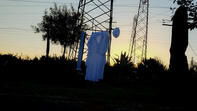Running a Shebeen
One of the inevitable consequences of prohibition is bootlegging, with all its attendant crimes and profits. Many shebeen owners are known to have had shady pasts and none more so than Godfrey Moloi, the Godfather of Soweto.

Even though he is one of Soweto's business heavyweights, he delayed licensing his Blue Flame shebeen for some time, because the idea of running a legal place somehow did not appeal to this daring old outlaw. Moloi made his name, and most of his money, operating as the city's most effective 'runner', the local name for a bootlegger.
To outwit the police, he bought three identical cars. When doing deliveries he would send two of the cars off ahead as decoys. If the police tried to stop them, the two front riders would speed off with the police in hot pursuit and a car chase through the township streets would ensue. The car carrying the precious contraband would then drive sedately to its rendezvous, and Moloi's reputation and bank balance would blossom. 'We black people are a warm society,' he told Tribute magazine.
'We want to sit together when we drink. That is something those silly Dutch boys (Afrikaners) could never understand. Same as they could never understand why these shebeens sprung up all over the place.' He said he had not been raided for a long time but could never tell with the police.
‘I think the thing about them is that they want action. They cool off when there's riots and stuff like that, but the moment there is peace they start their nonsense again.' Moloi had style, the old jazz style of Sophiatown, where he grew up, learning to imitate the big-time gangsters with their flashy clothes, expensive shoes and American limousines.
He lived with 'the people' in a modest four-roomed house in Mapetla, and he spent much of his days chatting with passersby. Moloi's place is still easy to find: it is the one with the shining fleet of Mercedes Benzes outside. The first question he pops to a visitor is 'what do you take?' and within seconds the drink is there.
A Stokvel
You do not have to run a shebeen to make money from selling booze, but it is the surest way. A stokvel is a type of savings club party where a person sends out invitations to all his or her friends, and they, in turn, tell their friends. The person holding the stokvel might hire a marquee tent for the occasion and lay on heaps of booze and food and, if they are clever, music too. Although a party atmosphere prevails, everything is for sale.
Stokvels are always well attended because the revellers know that the next one might be theirs. These parties developed from get-togethers that were organized by small social groups to help each member in turn to raise money. Madala Oscar is luckier than some, having to travel only as far as Johannesburg to work; others may have to commute to Nigel or Springs. These people get up at around 4.30 am to catch a taxi, maybe two trains and even a second taxi to get to work on time.
The same procedure is repeated to get home again, only arriving back to Soweto after dark. This leaves little time for domestic chores like washing and cooking or for sleeping, and no time at all for socializing. For Madala, however, the world of shebeens beckons; drinks with his 'connections' and dancing to a mixture of mbaqanga and American funk.
On Monday nights he and his friends go to a club with the hope of meeting a girl on 'ladies night'. He will ask her to be his 'coal stove', someone to keep him warm. Sowetans may appear to have cast off tribal dress and traditions to lead a dizzy city life, but some old customs die hard: while the men are out drinking, most women must stay at home to do the washing, the cooking, and to look after the children.
One does find unaccompanied women at shebeens and now even more at posh taverns and clubs, but the average married woman in Soweto plays the role of a 'traditional' wife. The men know that liberation means equality for women too, but few of them are prepared to practise it.
By David Bristow